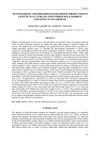 January 2016 in “Springer eBooks”
January 2016 in “Springer eBooks” Alopecia Areata is an unpredictable autoimmune hair loss condition with limited and variable treatment effectiveness.
 January 2006 in “Elsevier eBooks”
January 2006 in “Elsevier eBooks” Cats with Feline Symmetrical Alopecia can regrow hair with proper treatment based on the specific cause, including diet, medication, or stress management.
 April 2003 in “Experimental Dermatology”
April 2003 in “Experimental Dermatology” The workshop highlighted the genetic links and psychological impacts of hair loss and skin disorders.
 January 2011 in “Journal of biological research”
January 2011 in “Journal of biological research” Endocrine disruptors may cause early hair loss.
 521 citations,
January 1954 in “Physiological Reviews”
521 citations,
January 1954 in “Physiological Reviews” Hair growth is cyclic and influenced mainly by local factors.
 61 citations,
January 2019 in “American Journal of Clinical Dermatology”
61 citations,
January 2019 in “American Journal of Clinical Dermatology” The cause of Frontal Fibrosing Alopecia is unclear, diagnosis involves clinical evaluation and various treatments exist, but their effectiveness is uncertain.
 57 citations,
May 2014 in “Molecular Phylogenetics and Evolution”
57 citations,
May 2014 in “Molecular Phylogenetics and Evolution” The research found how GPCR Class A Rhodopsin receptors are related and suggested possible substances they interact with.
 52 citations,
October 2004 in “Veterinary dermatology”
52 citations,
October 2004 in “Veterinary dermatology” Melatonin and mitotane treatment led to hair re-growth in 62% of dogs with Alopecia X, but this was not always linked to normal hormone levels.
 16 citations,
July 2012 in “The New England Journal of Medicine”
16 citations,
July 2012 in “The New England Journal of Medicine” The patient was diagnosed with anorexia nervosa and severe malnutrition, requiring urgent refeeding and monitoring.
 14 citations,
January 2015 in “Current problems in dermatology”
14 citations,
January 2015 in “Current problems in dermatology” Female pattern hair loss treatments vary in effectiveness and may have side effects.
 10 citations,
October 2014 in “Journal of Ovarian Research”
10 citations,
October 2014 in “Journal of Ovarian Research” The IRS-2 Asp/Asp genotype may increase the risk of PCOS in Chinese women, especially if they are not obese.
 6 citations,
June 2000 in “Psychiatric Services”
6 citations,
June 2000 in “Psychiatric Services” Maintaining sexual health after menopause is possible with patient approaches, hormone supplements, and therapy, despite needing more research.
 2 citations,
May 2001 in “Current problems in dermatology”
2 citations,
May 2001 in “Current problems in dermatology” The conclusion is that effectively treating hair disorders is difficult due to the complex factors affecting hair growth and more research is needed to improve treatments.
 1 citations,
December 2011
1 citations,
December 2011 Marine-derived ingredients show potential for hair health but need more human trials to confirm effectiveness.

The article suggests that patients with Frontal Fibrosing Alopecia may have more contact allergies, but it doesn't prove that allergies cause the condition.
 9 citations,
January 2022 in “Reproductive Biology and Endocrinology”
9 citations,
January 2022 in “Reproductive Biology and Endocrinology” High levels of male hormones and irregular periods best predict how well PCOS patients will respond to metformin treatment.
 1 citations,
March 2022 in “Clinical and Experimental Obstetrics & Gynecology”
1 citations,
March 2022 in “Clinical and Experimental Obstetrics & Gynecology” Ovarian volume is significantly related to higher levels of certain hormones in Korean women with PCOS.
 2 citations,
April 2023 in “BMC endocrine disorders”
2 citations,
April 2023 in “BMC endocrine disorders” The link between physical signs of high male hormones and hormone levels in women with PCOS changes with age.
 14 citations,
September 2017 in “Clinics in Dermatology”
14 citations,
September 2017 in “Clinics in Dermatology” Skin diseases linked to insulin resistance should be managed to prevent diabetes and reduce heart disease risk.
 1 citations,
July 2023 in “F&S Reviews”
1 citations,
July 2023 in “F&S Reviews” Some common medications may harm male fertility by affecting hormones, sperm production, and sexual function.
 27 citations,
March 2012 in “Dermatologic Therapy”
27 citations,
March 2012 in “Dermatologic Therapy” Taking zinc supplements can help improve or cure hair loss caused by zinc deficiency.
 12 citations,
March 2018 in “Medicine”
12 citations,
March 2018 in “Medicine” A postmenopausal woman's hirsutism and high testosterone levels improved after surgery for an ovarian tumor not seen on ultrasound.
 9 citations,
March 1985 in “Head & Neck Surgery”
9 citations,
March 1985 in “Head & Neck Surgery” Topical minoxidil is the most promising treatment for male pattern hair loss, but more research is needed to confirm its effectiveness and safety.
8 citations,
September 2005 in “Practical diabetes” PCOS is a condition causing irregular periods, excess male hormones, and infertility, often managed by targeting insulin resistance and specific symptoms.
 1 citations,
January 2008 in “Proceedings of the 9th World Rabbit Congress, Verona, Italy, 10-13 June 2008”
1 citations,
January 2008 in “Proceedings of the 9th World Rabbit Congress, Verona, Italy, 10-13 June 2008” Furless male rabbits grew slightly faster and heavier than furred ones, but testosterone levels were not the cause.
 June 2013 in “Expert Review of Dermatology”
June 2013 in “Expert Review of Dermatology” The article concludes that hormonal therapy is an effective long-term acne treatment, even for those without hormonal imbalances.
 September 2009 in “Dermato-endocrinology”
September 2009 in “Dermato-endocrinology” Good nutrition and vitamins are important for healthy skin and can prevent diseases.

Androgenetic alopecia, or hair loss, is caused by genetic factors and hormones, with different mechanisms in men and women, and can be linked to insulin resistance and polycystic ovary syndrome.
 90 citations,
December 2007 in “Current Oncology”
90 citations,
December 2007 in “Current Oncology” Non-hormonal treatments should be used first for sexual dysfunction in postmenopausal breast cancer patients on aromatase inhibitors, with hormones as a second option.
 66 citations,
November 2001 in “European journal of endocrinology”
66 citations,
November 2001 in “European journal of endocrinology” Low SHBG and high FAI, FT, and DHEAS levels are effective in identifying PCOS.





























